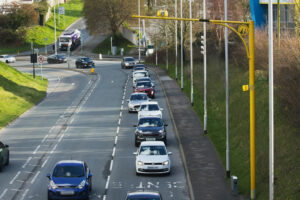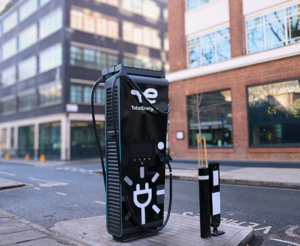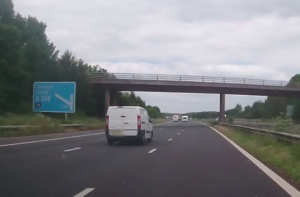Amey has completed works on the first Fibre Reinforced Polymer (FRP) footbridge in Kent.
The company replaced the existing Botany Footbridge in Tonbridge that crosses over the River Medway, which provides an important link for those using the town’s local supermarket.
Working on behalf of Kent County Council, Amey explored the options of implementing a new structure replacing the old railway sleepers with a more sustainable and future proof option.
According to Amey, there can be numerous benefits of using FRP in construction. In the case of Botany Bridge, the FRP composites are lightweight so the bridge decks are less than half the weight of steel or timber bridges making them easier and safer to install as they are fabricated offsite and then lifted into place on site. The FRP materials are also renowned for their durability and have been used in all types of industries, including the marine and wind energy sectors.
David Matthews, Account Director for Amey in Kent, said: “Our teams have worked throughout the pandemic, respecting social distancing to complete the first plastic footbridge in Kent. I’m incredibly proud of the team involved, who completed the works to schedule even in challenging conditions. The material we have used in the new footbridge will increase the lifespan of the bridge as well as reduce the need for regular maintenance, therefore making the bridge more efficient and cost effective for the Council. I hope that the footbridge will be enjoyed by many residents, now, and in years to come.”
Kent County Council Cabinet Member for Highways and Transport, and Member for Tonbridge, Michael Payne said: “This work was carried out to provide a strengthened and refurbished bridge to ensure it continues to be a safe river crossing for the public to use. The original deck was made from railway rails with a type of expanded metal mesh reinforcement, but unfortunately it wasn’t able to handle the number of people using it.
“This new bridge provides a durable low maintenance solution compared to traditional solutions, especially in the damp environment above the river. The lightweight nature of FRP means installation is faster, simpler and safer and inspection and maintenance in the future will be considerably easier.
“Kent Highways also took the opportunity to clear vegetation from the Public Right of Way whilst the footpath was closed as well as closing off gaps in the original fencing to protect people from accessing the river and service pipes crossing the river.”
The use of Fibre Reinforced Polymer (FRP) has been used successfully in the construction industry for over 50 years. Bridge structures have been constructed using these materials in the last 25 years but only in the last ten years has there been a more consistent use of these materials utilising the technological developments in design and manufacturing from other industries.
























